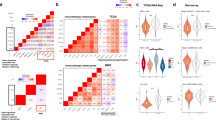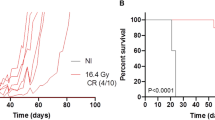Abstract
The expression of immune-related genes in cancer cells can alter the anti-tumor immune response and thereby impact patient outcomes. Radiotherapy has been shown to modulate immune-related genes dependent on the fractionation regimen. To identify long-term changes in gene expression after irradiation, PC3 (p53 deleted) and LNCaP (p53 wildtype) prostate cancer cells were irradiated with either a single dose (SD, 10 Gy) or a fractionated regimen (MF) of 10 fractions (1 Gy per fraction). Whole human genome arrays were used to determine gene expression at 24 h and 2 months after irradiation. Immune pathway activation was analyzed with Ingenuity Pathway Analysis software. Additionally, 3D colony formation assays and T-cell cytotoxicity assays were performed. LNCaP had a higher basal expression of immunogenic genes and was more efficiently killed by cytotoxic T-cells compared to PC3. In both cell lines, MF irradiation resulted in an increase in multiple immune-related genes immediately after irradiation, while at 2 months, SD irradiation had a more pronounced effect on radiation-induced gene expression. Both immunogenic and immunosuppressive genes were upregulated in the long term in PC3 cells by a 10 Gy SD irradiation but not in LNCaP. T-cell-mediated cytotoxicity was significantly increased in 10 Gy SD PC3 cells compared to the unirradiated control and could be further enhanced by treatment with immune checkpoint inhibitors. Irradiation impacts the expression of immune-related genes in cancer cells in a fractionation-dependent manner. Understanding and targeting these changes may be a promising strategy for primary prostate cancer and recurrent tumors.





Similar content being viewed by others
References
Siegel RL, Miller KD, Jemal A (2019) Cancer statistics, 2019. CA Cancer J Clin 69:7–34. https://doi.org/10.3322/caac.21551
Vinay DS, Ryan EP, Pawelec G et al (2015) Immune evasion in cancer: Mechanistic basis and therapeutic strategies. Semin Cancer Biol 35:S185–S198. https://doi.org/10.1016/J.SEMCANCER.2015.03.004
Aptsiauri N, Cabrera T, Garcia-Lora A, Garrido F (2012) Cancer immune escape: Implications for immunotherapy, Granada, Spain, October 3–5, 2011. In: Cancer Immunology, Immunotherapy. Springer, pp 739–745
Lorente D, Fizazi K, Sweeney C, de Bono JS (2016) Optimal treatment sequence for metastatic castration-resistant prostate cancer. Eur Urol Focus 2:488–498
Williams SG, Aw Yeang HX, Mitchell C et al (2020) Immune molecular profiling of a multiresistant primary prostate cancer with a neuroendocrine-like phenotype: a case report. BMC Urol. https://doi.org/10.1186/s12894-020-00738-8
Zaorsky NG, Shaikh T, Murphy CT et al (2016) Comparison of outcomes and toxicities among radiation therapy treatment options for prostate cancer. Cancer Treat Rev 48:50–60
Eke I, Makinde AY, Aryankalayil MJ et al (2018) Exploiting radiation-induced signaling to increase the susceptibility of resistant cancer cells to targeted drugs: AKT and mTOR inhibitors as an example. Mol Cancer Ther 17:355–367. https://doi.org/10.1158/1535-7163.MCT-17-0262
Eke I, Makinde AY, Aryankalayil MJ et al (2018) Long-term tumor adaptation after radiotherapy: therapeutic implications for targeting integrins in prostate cancer. Mol Cancer Res 16:1855–1864. https://doi.org/10.1158/1541-7786.MCR-18-0232
Eke I, Bylicky MA, Sandfort V et al (2021) The lncRNA LINC00261 and LINC00665 are upregulated in long-term prostate cancer adaptation after radiotherapy and are potentially novel therapeutic targets. Mol Ther - Nucleic Acids 24:175–187. https://doi.org/10.1016/j.omtn.2021.02.024
Aryankalayil MJ, Makinde AY, Gameiro SR et al (2014) Defining molecular signature of pro-immunogenic radiotherapy targets in human prostate cancer cells. Radiat Res 182:139–148. https://doi.org/10.1667/RR13731.1
Schaue D, Ratikan JA, Iwamoto KS, McBride WH (2012) Maximizing tumor immunity with fractionated radiation. Int J Radiat Oncol Biol Phys 83:1306–1310. https://doi.org/10.1016/j.ijrobp.2011.09.049
Vanpouille-Box C, Alard A, Aryankalayil MJ et al (2017) DNA exonuclease Trex1 regulates radiotherapy-induced tumour immunogenicity. Nat Commun 8:15618. https://doi.org/10.1038/ncomms15618
Comiskey MC, Dallos MC, Drake CG (2018) Immunotherapy in prostate cancer: teaching an old dog new tricks. Curr Oncol Rep 20:75. https://doi.org/10.1007/s11912-018-0712-z
Zitvogel L, Kroemer G (eds) (2018) Oncoimmunology: a practical guide for cancer immunotherapy,1st edn. Springer. https://doi.org/10.1007/978-3-319-62431-0
Blades RA, Keating PJ, McWilliam LJ et al (1995) Loss of HLA class I expression in prostate cancer: Implications for immunotherapy. Urology 46:681–687. https://doi.org/10.1016/S0090-4295(99)80301-X
Mao W, Ghasemzadeh A, Freeman ZT et al (2019) Immunogenicity of prostate cancer is augmented by BET bromodomain inhibition. J Immunother Cancer 7:277. https://doi.org/10.1186/s40425-019-0758-y
Mahmoud AM (2018) Cancer testis antigens as immunogenic and oncogenic targets in breast cancer. Immunotherapy 10:769–778. https://doi.org/10.2217/imt-2017-0179
Scanlan MJ, Simpson AJG, Old LJ (2004) The cancer/testis genes: review, standardization, and commentary. Cancer Immun 4:1
Caballero OL, Chen Y-T (2009) Cancer/testis (CT) antigens: potential targets for immunotherapy. Cancer Sci 100:2014–2021. https://doi.org/10.1111/j.1349-7006.2009.01303.x
Gedye C, Quirk J, Browning J et al (2009) Cancer/testis antigens can be immunological targets in clonogenic CD133+ melanoma cells. Cancer Immunol Immunother 58:1635–1646. https://doi.org/10.1007/s00262-009-0672-0
Smith HA, McNeel DG (2010) The SSX family of cancer-testis antigens as target proteins for tumor therapy. Clin Dev Immunol 2010:150591. https://doi.org/10.1155/2010/150591
Bloom JE, McNeel DG (2016) SSX2 regulates focal adhesion but does not drive the epithelial to mesenchymal transition in prostate cancer. Oncotarget 7:50997–51011. https://doi.org/10.18632/oncotarget.9802
Eke I, Zong D, Aryankalayil MJ et al (2020) 53BP1/RIF1 signaling promotes cell survival after multifractionated radiotherapy. Nucleic Acids Res 48:1314–1326. https://doi.org/10.1093/nar/gkz1139
Eke I, Zscheppang K, Dickreuter E, et al (2015) Simultaneous β1 integrin-EGFR targeting and radiosensitization of human head and neck cancer. J Natl Cancer Inst 107 dju419. Doi: https://doi.org/10.1093/jnci/dju419
Eke I, Schneider L, Förster C et al (2013) EGFR/JIP-4/JNK2 signaling attenuates cetuximab-mediated radiosensitization of squamous cell carcinoma cells. Cancer Res 73:297–306. https://doi.org/10.1158/0008-5472.CAN-12-2021
Wu D, Joyee A, Nandagopal S et al (2013) Effects of clostridium difficile toxin A and B on human T lymphocyte migration. Toxins (Basel) 5:926–938. https://doi.org/10.3390/toxins5050926
Zheng DQ, Woodard AS, Fornaro M et al (1999) Prostatic carcinoma cell migration via α(v)β3 integrin is modulated by a focal adhesion kinase pathway. Cancer Res 59:1655–1664
Demaria S, Golden EB, Formenti SC (2015) Role of local radiation therapy in cancer immunotherapy. JAMA Oncol 1:1325. https://doi.org/10.1001/jamaoncol.2015.2756
Sathianathen NJ, Krishna S, Konety BR, Griffith TS (2017) The synergy between ionizing radiation and immunotherapy in the treatment of prostate cancer. Immunotherapy 9:1005–1018. https://doi.org/10.2217/imt-2017-0051
Keam SP, Halse H, Nguyen T et al (2020) High dose-rate brachytherapy of localized prostate cancer converts tumors from cold to hot. J Immunother cancer 8:792. https://doi.org/10.1136/jitc-2020-000792
Schaue D, Xie MW, Ratikan JA, McBride WH (2012) Regulatory T cells in radiotherapeutic responses. Front Oncol 2:90
Formenti SC, Rudqvist N-P, Golden E et al (2018) Radiotherapy induces responses of lung cancer to CTLA-4 blockade. Nat Med 24:1845–1851. https://doi.org/10.1038/s41591-018-0232-2
Wennerberg E, Spada S, Rudqvist NP et al (2020) CD73 Blockade promotes dendritic cell infiltration of irradiated tumors and tumor rejection. Cancer Immunol Res 8:465–478. https://doi.org/10.1158/2326-6066.CIR-19-0449
Sia J, Hagekyriakou J, Chindris I et al (2021) Regulatory T cells shape the differential impact of radiation dose-fractionation schedules on host innate and adaptive anti-tumor immune defenses. Int J Radiat Oncol. https://doi.org/10.1016/j.ijrobp.2021.05.014
Sistigu A, Yamazaki T, Vacchelli E et al (2014) Cancer cell–autonomous contribution of type I interferon signaling to the efficacy of chemotherapy. Nat Med 20:1301–1309. https://doi.org/10.1038/nm.3708
Chiappinelli KB, Strissel PL, Desrichard A et al (2015) Inhibiting DNA methylation causes an interferon response in cancer via dsRNA including endogenous retroviruses. Cell 162:974–986. https://doi.org/10.1016/j.cell.2015.07.011
Minn AJ, Wherry EJ (2016) Combination cancer therapies with immune checkpoint blockade: convergence on interferon signaling. Cell 165:272–275
Palayoor ST, John-Aryankalayil M, Makinde AY et al (2014) Differential expression of stress and immune response pathway transcripts and miRNAs in normal human endothelial cells subjected to fractionated or single-dose radiation. Mol Cancer Res 12:1002–1015. https://doi.org/10.1158/1541-7786.MCR-13-0623
Tsai M-H, Cook JA, Chandramouli GVR et al (2007) Gene expression profiling of breast, prostate, and glioma cells following single versus fractionated doses of radiation. Cancer Res 67:3845–3852. https://doi.org/10.1158/0008-5472.CAN-06-4250
Ogony J, Choi HJ, Lui A et al (2016) Interferon-induced transmembrane protein 1 (IFITM1) overexpression enhances the aggressive phenotype of SUM149 inflammatory breast cancer cells in a signal transducer and activator of transcription 2 (STAT2)-dependent manner. Breast Cancer Res 18:1–19. https://doi.org/10.1186/s13058-016-0683-7
Lee J, Goh SH, Song N et al (2012) Overexpression of IFITM1 has clinicopathologic effects on gastric cancer and is regulated by an epigenetic mechanism. Am J Pathol 181:43–52. https://doi.org/10.1016/j.ajpath.2012.03.027
Yu F, Xie D, Ng SS et al (2015) IFITM1 promotes the metastasis of human colorectal cancer via CAV-1. Cancer Lett 368:135–143. https://doi.org/10.1016/j.canlet.2015.07.034
Garnett CT, Palena C, Chakarborty M et al (2004) Sublethal irradiation of human tumor cells modulates phenotype resulting in enhanced killing by cytotoxic T lymphocytes. Cancer Res 64:7985–7994. https://doi.org/10.1158/0008-5472.CAN-04-1525
Wang Y, Xu M, Che M et al (2005) Curative antitumor immune response is optimal with tumor irradiation followed by genetic induction of major histocompatibility complex Class I and Class II molecules and suppression of ii protein. Hum Gene Ther 16:187–199. https://doi.org/10.1089/hum.2005.16.187
Greve KBV, Lindgreen JN, Terp MG et al (2015) Ectopic expression of cancer/testis antigen SSX2 induces DNA damage and promotes genomic instability. Mol Oncol 9:437–449. https://doi.org/10.1016/j.molonc.2014.09.001
van Bokhoven A, Varella-Garcia M, Korch C et al (2003) Molecular characterization of human prostate carcinoma cell lines. Prostate 57:205–225. https://doi.org/10.1002/pros.10290
Griffioen M, Steegenga WT, Ouwerkerk IJM et al (1998) Repression of the minimal HLA-B promoter by c-myc and p53 occurs through independent mechanisms. Mol Immunol 35:829–835. https://doi.org/10.1016/S0161-5890(98)00074-1
Valerie K, Yacoub A, Hagan MP et al (2007) Radiation-induced cell signaling: inside-out and outside-in. Mol Cancer Ther 6:789–801. https://doi.org/10.1158/1535-7163.MCT-06-0596
Aypar U, Morgan WF, Baulch JE (2011) Radiation-induced epigenetic alterations after low and high LET irradiations. Mutat Res Mol Mech Mutagen 707:24–33. https://doi.org/10.1016/J.MRFMMM.2010.12.003
Acknowledgements
The results shown here are in part based upon data generated by the TCGA Research Network. We would like to thank the TCGA Research Network and the specimen donors. The authors thank Dr. David Cerna (NIH), Dr. Adeola Makinde (NIH), and Dr. Mansoor Ahmed (NIH) for excellent technical assistance.
Funding
This study was supported by the NIH Intramural Research Program, National Cancer Institute, Center for Cancer Research (grant ZIA BC 010670 to C.N.C) and the NIH Research Program, National Cancer Institute (grant CA197136 to E.G., training grant T32CA121940 to I.E.).
Author information
Authors and Affiliations
Contributions
I.E., M.J.A., C.V., and C.N.C. contributed to conceptualization; I.E., M.J.A., S.N., and V.S. contributed to methodology; I.E., M.J.A., M.A.B., and V.S. contributed to investigation; I.E. contributed to writing—original draft; I.E., M.J.A., M.A,B, C.V., E.E.G., and C.N.C. contributed to writing—review and editing; E.E.G. and C.N.C. contributed to funding acquisition; I.E., and C.N.C contributed to supervision.
Corresponding author
Ethics declarations
Conflict of interest
The authors report no conflicting or competing interests.
Data availability
Research data and material are stored in an institutional repository and will be shared upon request to the corresponding author. The Cancer Genome Atlas (TCGA) data are available through the Genomic Data Commons Data Portal (https://portal.gdc.cancer.gov/).
Additional information
Publisher's Note
Springer Nature remains neutral with regard to jurisdictional claims in published maps and institutional affiliations.
Supplementary Information
Below is the link to the electronic supplementary material.
Rights and permissions
About this article
Cite this article
Eke, I., Aryankalayil, M.J., Bylicky, M.A. et al. Long-term expression changes of immune-related genes in prostate cancer after radiotherapy. Cancer Immunol Immunother 71, 839–850 (2022). https://doi.org/10.1007/s00262-021-03036-w
Received:
Accepted:
Published:
Issue Date:
DOI: https://doi.org/10.1007/s00262-021-03036-w




